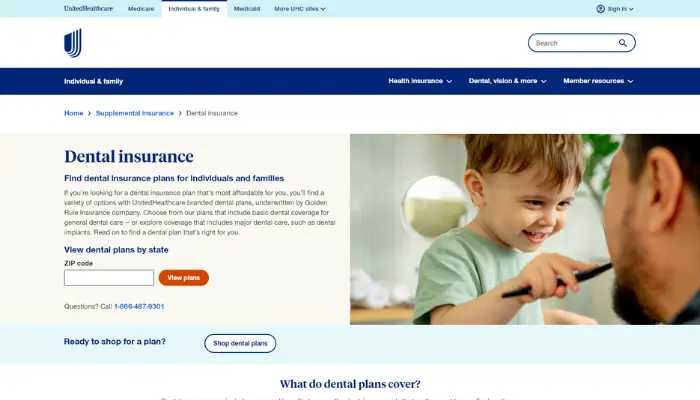Save with UnitedHealthcare Dental: Coverage Tips and Benefits
When it comes to oral health care, the key is to choose a dental plan that meets your needs well. UnitedHealthcare Dental offers different types of plans and benefits that may be suitable for you and your family.
Advertising
This post will delve into coverage options, as well as the benefits, costs, and more of Medicare Advantage, from a human perspective.
Dental Insurance Plans and Coverage Options
Advertising
Choosing the right dental insurance plan can seem like a daunting task, but with UnitedHealthcare Dental, you have access to various options that can perfectly fit your budget and needs. Let’s explore the main types of plans available:
PPO (Preferred Provider Organization)
PPO plans offer excellent flexibility, allowing you to choose any dentist. However, you save more by opting for an in-network dentist.
Advertising
This type of plan is ideal for those who value the freedom of choice and still want to keep costs under control.
Additionally, PPOs typically cover a wide range of preventive, diagnostic, and treatment services, ensuring you have access to necessary dental care.
HMO (Health Maintenance Organization)
HMO plans generally have lower premiums and fixed copayments for services, making them an economical option. However, you must use network dentists to receive benefits.
This plan is perfect for those seeking a more affordable option and willing to follow network guidelines. HMOs are known for their emphasis on prevention and routine care, which can help avoid more severe and costly dental problems in the future.
Indemnity Plans
Indemnity plans are the most traditional and allow you to visit any dentist. They offer the greatest freedom of choice but usually have higher premiums and require payment of a percentage of service costs (coinsurance).
These plans are ideal for those who prefer maximum flexibility and don’t mind paying a bit more for it. Additionally, these plans often have no network restrictions, meaning you can visit any dentist and still receive coverage benefits.
Each type of plan has its unique advantages. It is crucial to consider your specific dental health needs, budget, and personal preferences when choosing the best plan for you. By doing so, you can ensure you are getting the maximum benefit from your UnitedHealthcare dental insurance.
Dental Benefits of Medicare Advantage

If you are eligible for Medicare, UnitedHealthcare Dental offers Medicare Advantage plans that include comprehensive dental benefits. These plans are an excellent way to obtain additional coverage that is not included in Original Medicare.
Preventive and Comprehensive Coverage
UnitedHealthcare Dental’s Medicare Advantage plans can include a wide range of services, from routine cleanings to complex treatments like crowns and root canals.
Preventive coverage typically has no waiting period, meaning you can start using your benefits immediately. This ensures that you can maintain your oral health without delays, addressing potential issues before they become serious.
Extensive Network of Dentists
With a vast network of dentists, finding a professional near you who accepts your plan is easy. This extensive network provides convenience and ensures you receive quality care.
The ability to choose from numerous qualified dentists means you can select a provider that best meets your needs and preferences, enhancing your overall healthcare experience.
Additional Benefits
Medicare Advantage plans often come with added perks that can significantly enhance your dental care. These might include coverage for vision and hearing, wellness programs, and discounts on various health services.
By choosing a UnitedHealthcare Dental Medicare Advantage plan, you can benefit from a more comprehensive approach to your overall health and well-being.
Cost of Dental Insurance
Understanding the costs associated with dental insurance is crucial for making an informed choice. Here are some of the main components of the costs of a dental insurance plan:
Premiums
This is the amount you pay monthly to have coverage. Premiums vary depending on the type of plan you choose. HMO plans generally have lower premiums compared to PPO and indemnity plans.
Deductibles
The deductible is the amount you pay out of pocket for covered services before your plan starts paying. After reaching the deductible, you will pay a percentage of the service costs (coinsurance) or a fixed amount (copay).
Coinsurance and Copay
Coinsurance is the percentage of costs you pay after reaching the deductible. For example, if you have a 20% coinsurance, you will pay 20% of the cost of a service, while the plan covers the remaining 80%.
The copay is a fixed amount paid for specific services, such as a consultation or an X-ray.
Frequently Asked Questions about Dental Coverage
Having questions about dental coverage is common, especially when considering the variety of plans available.
Here are some of the most frequently asked questions about how dental insurance plans work, which plan is best for you, and what to expect in terms of waiting periods.
How Do Dental Insurance Plans Work?
Dental insurance plans operate similarly to health insurance. Here’s how they work:
- Monthly Premium: You pay a monthly fee to maintain coverage.
- Coverage: Coverage can range from preventive care to more complex treatments. This includes regular cleanings, exams, fillings, crowns, and root canals.
What is the Best Dental Plan for Me?
Choosing the best dental plan depends on your specific needs. Consider the following factors:
- Cost: Compare the monthly premiums and other associated costs.
- Coverage: Check which services are covered and to what extent.
- Current Dentist: Determine if you want to keep your current dentist. PPO plans offer greater flexibility, while HMOs are more economical but require using network dentists.
Is There a Waiting Period?
Waiting periods can vary by plan. It’s important to understand the following points:
- Preventive Services: Many plans do not have a waiting period for preventive services, such as cleanings and exams.
- Basic and Major Services: There may be waiting periods of 6 to 12 months for services like fillings, crowns, and root canals.
Network of Dental Service Providers
One of the major advantages of UnitedHealthcare Dental is its extensive network of providers. This means you will have access to a wide variety of dentists and specialists across the country, ensuring you receive the care you need wherever you are.
How to Find an In-Network Dentist
Finding an in-network dentist is simple with UnitedHealthcare’s online directory. Here’s how you can do it:
- Visit the Online Directory: Go to UnitedHealthcare’s website and access the dental provider directory.
- Enter Your ZIP Code: Input your ZIP code to view a list of nearby dentists who accept your plan.
- Filter Your Search: Use the available filters to narrow down your search based on your specific needs and preferences.
Advantages of Using In-Network Dentists
Utilizing in-network dentists can result in significant cost savings. Here are some benefits:
- Reduced Rates: In-network dentists agree to offer services at reduced rates, which can substantially lower your overall treatment costs.
- Simplified Billing: Since these dentists have agreements with UnitedHealthcare, the billing process is often more straightforward and hassle-free.
- Quality Assurance: In-network providers are vetted by UnitedHealthcare, ensuring you receive quality care from trusted professionals.
Oral Health Benefits
Having a good dental insurance plan goes beyond just covering treatment costs. It also encourages regular maintenance of oral health, which can positively impact your overall health.
Prevention of Major Problems
Regular dental care helps prevent oral health issues that can lead to more serious complications. Here’s how:
- Heart Disease: Good oral health can reduce the risk of heart disease.
- Diabetes: Proper dental care helps manage and prevent diabetes-related complications.
- Early Detection: Routine check-ups and cleanings can detect early signs of dental problems, making them easier and less expensive to treat.
Improvement in Quality of Life
Maintaining good oral health not only helps to avoid pain and discomfort but also boosts confidence and overall quality of life. The benefits include:
- Pain Prevention: Regular care prevents toothaches and other discomforts.
- Confidence Boost: A healthy smile enhances self-esteem and social interactions.
- Better Overall Health: Avoiding dental issues prevents potential embarrassment and inconvenience, contributing to a higher quality of life.
Waiting Period for Dental Services
Understanding the waiting periods for different dental services is crucial for planning your dental care effectively. UnitedHealthcare offers various dental insurance plans, and the waiting periods can differ among them.
Preventive Services
Typically, there is no waiting period for preventive services such as cleanings and exams. This means you can start using these benefits immediately after your plan is activated, ensuring you maintain good oral health from the start.
Basic and Major Services
For basic services like fillings and major services like crowns, there may be a waiting period of 6 to 12 months. Here’s a breakdown:
- Basic Services: Services such as fillings, extractions, and simple restorative procedures often have a waiting period of around 6 months.
- Major Services: More complex procedures like crowns, bridges, dentures, and root canals typically have a longer waiting period, ranging from 6 to 12 months.
Importance of Reviewing Plan Details
It is essential to review the specifics of your plan to understand the waiting periods applicable to different services. This helps you plan your treatments accordingly and avoid unexpected delays. Ensure you:
- Read the Plan Summary: Carefully go through the plan summary provided by UnitedHealthcare.
- Consult Customer Service: If you have any questions, contact customer service for clarifications.
- Plan Ahead: Schedule your dental treatments based on the waiting periods to maximize your benefits.
Additional Benefits of the Dental Plan
In addition to dental care, many UnitedHealthcare Dental plans offer additional benefits that can be extremely useful.
Vision and Hearing Coverage
In some states, plans may include additional benefits for vision and hearing care. This provides more comprehensive coverage for your health needs.
Wellness Programs
Some plans also offer wellness programs that encourage healthy habits, such as balanced diets and physical exercise, which can contribute to overall and oral health.
Forms and Guides for Dental Providers
Dental health professionals participating in the UnitedHealthcare Dental network have access to a variety of resources to help manage their services and enhance patient experience.
Resource Library
UnitedHealthcare provides an online resource library with forms, guides, and clinical guidelines. These resources are designed to help providers better understand policies and offer the best possible care.
Training and Continuing Education
The Dental Provider Online Academy offers continuing education courses for dental health professionals. These courses help keep providers updated with best practices and new technologies.
Support and Assistance
Providers have access to dedicated support to resolve any questions or issues that may arise. This support ensures that providers can focus on patient care without additional concerns.
With so many options and benefits, choosing a UnitedHealthcare dental insurance plan can be an excellent decision for maintaining your oral health. We hope this guide has helped clarify your doubts and provide the necessary information to make the best choice.
Remember, oral health is a crucial part of your overall well-being. Investing in a good dental insurance plan, such as those offered by UnitedHealthcare, can significantly impact your health and quality of life.
By ensuring regular preventive care and providing coverage for necessary treatments, a comprehensive dental plan helps you maintain a healthy smile and avoid more serious health issues down the line. Make the informed choice today for a healthier tomorrow.




